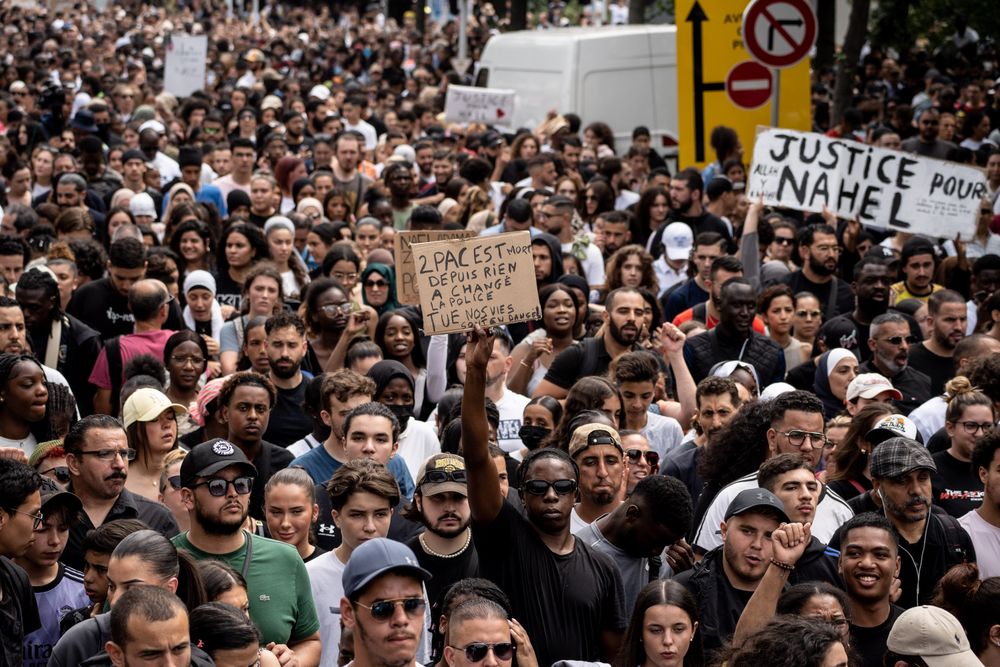When the video of the police murder of George Floyd was released, protests sprung up all over America and the world, including France.
In June 2020, protests broke out all over France in solidarity with American protests about racism and police overreach. I visited France a year later and saw Black Lives Matter signs in Paris and rural areas in the South of France. France cared about what was going on in America and protested for change.
On June 27, 2023, French police officers shot and killed 17-year-old Nahel Merzouk during a traffic stop in a Paris suburb. The suburbs in Paris don't mean what you might imagine when thinking of an American suburb. They aren't where people move to as their disposable income increases and they desire to get out of the city. Don't look for open spaces and green lawns. The suburbs of Paris are where workers are housed, dating back to when Africans were conscripted to work in Paris factories while France was at war. Africans were welcome as they kept the country afloat until the war was over. In later decades, the "banlieues" were expanded to accommodate the increasing migrant population of France.
While the French people rose in support of American communities that are overpoliced and brutalized, America has barely taken notice of what was going on in France.
The two officers involved in the stop initially said the teenager drove his car at them, and they "feared for their lives." Like the George Floyd case, a video showed they lied and were never in danger. The following video is disturbing but is not graphic.
À Nanterre, un jeune automobiliste de 17 ans a été tué par la police après un refus d’obtempérer. pic.twitter.com/YS9jJpG68V
— Views (@viewsfrance) June 27, 2023
Before 2017, French officers had to demonstrate the need for self-defense before shooting a suspect. A less-restrictive law was passed, creating more circumstances where they could fire their weapons.
- 1° When attacks on life or physical integrity are made against them or against others or when armed persons threaten their life or physical integrity or those of others;
- 2° When, after two summonses given aloud, they cannot otherwise defend the premises they occupy or the persons entrusted to them;
- 3° When, immediately after two summonses addressed aloud, they cannot compel to arrest, other than by the use of arms, persons who seek to escape their custody or their investigations and who are likely to perpetrate , in their flight, attacks on their life or physical integrity or those of others;
- 4° When they cannot immobilize, other than by the use of weapons, vehicles, boats or other means of transport, whose drivers do not obey the order to stop and whose occupants are likely to perpetrate , in their flight, attacks on their life or physical integrity or those of others;
- 5° For the exclusive purpose of preventing the reiteration, in a short time, of one or more murders or attempted murders that have just been committed, when they have real and objective reasons to consider that this reiteration is likely given the information they have at the time they use their weapons.
Since that law passed, shootings and fatalities have significantly increased. Thirteen people were killed during police stops last year alone. The officer that fired the shot has been charged with voluntary homicide and was placed in preliminary detention. A GoFundMe page quickly raised over a million dollars. A similar fund for the victim raised a quarter as much.
Protests about police brutality aren't new in France, but America has mostly ignored them. Unless you're a newshound, you may not even be aware of the French protests that have lasted more than a week.
After a few days of accommodating the protesters, France is trying to arrest their way out of the problem. The police are becoming increasingly aggressive and have made more than 1,300 arrests thus far. Says Green party leader Marine Tondelier: "You get the feeling that our police is becoming like America's."
While the French people rose in support of American communities that are overpoliced and brutalized, America has barely taken notice of what was going on in France.
American entities have issued travel advisories for Paris, but that's the extent of American involvement. Some might sum up America's attitude: "We don't know, and we don't care." They're right. Americans aren't getting involved because we haven't solved our own problems, perhaps. That would assume, however, that we're capable of shame—food for thought.
This post originally appeared on Medium and is edited and republished with author's permission. Read more of William Spivey's work on Medium. And if you dig his words, buy the man a coffee.
